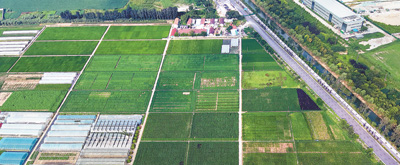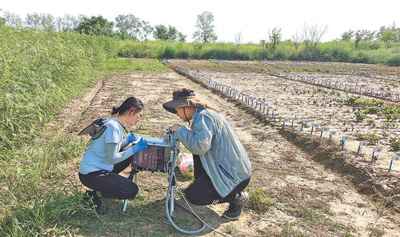Yancheng, a coastal city in east China\’s Jiangsu Province, has utilized the saline-alkaline land according to local conditions, which has improved the ecological environment and brought wealth to farmers, generating significant economic, social and ecological benefits.
As a major agricultural city, Yancheng is home to 11.6 million mu (773,333 hectares) of farmland, including nearly 5 million mu transformed from saline-alkaline land.

Photo shows the experiment base for varieties of salt-resistant crops of the Jiangsu Coastal Area Institute of Agricultural Sciences. (Photo/Xian Xueming)
In early September, rice grows well in over 8,000 mu of fields transformed from saline-alkaline land in Tinghu district, Yancheng. According to a local grain grower, rice and wheat are now grown in one season per year in the once-barren saline-alkaline farmland, and the average yield per mu can reach 700 kilograms and 550 kilograms, respectively.
To ameliorate and utilize saline-alkaline land, the Xinyang Agricultural Experiment Station was established in Yancheng in 1952, which was later affiliated with the Jiangsu Coastal Area Institute of Agricultural Sciences and began to explore the path for the comprehensive utilization of saline-alkaline land in Tinghu district.
Back then, the experiment station dug ditches to wash away salt with rainwater, said Hong Lizhou, head of the experiment station.
With the continuous improvement in watercourses and farmland water conservancy projects in the 1990s, irrigation water was used to wash away salt. By 2000, the average salt content in the soil of the 8,000-plus mu of fields was lowered to less than 0.2 percent, Hong added. Chemical amendments were used to reduce the alkalinity and improve the fertility of the soil. Chemical amendments could cut the pH value of the land from 8.5 to 8.0, providing the necessary conditions for crop growth.
The Tiaozini demonstration planting base that covers an area of 101,200 mu of the Jiangsu Coast Development Group Co., Ltd. in Dongtai, a county-level city under the administration of Yancheng, is another example of ameliorating saline-alkaline land.
\”We wash away salt with water conveyed through pipes,\” said Shang Hui, manager of the production department of Jiangsu Coast Development Group (Dongtai) Co., Ltd., adding that the method also increases the utilization rate of land and reduces non-point agricultural source pollution. Meanwhile, Suaeda salsa, a plant that can reduce soil salt content, and Sesbania cannabina, a plant that can fertilize the soil, are planted at the demonstration planting base as they can survive in highly alkaline soil.

Staff members of the Jiangsu Coastal Area Institute of Agricultural Sciences, who are responsible for the selection of varieties of salt-resistant crops, work in a field. (Photo/He Tingting)
Cultivating saline-alkaline tolerant varieties is also necessary. So far, Yancheng has cultivated more than 30 new varieties of salt-resistant and high-yielding crops and plants, including rice and soybean, said Xing Jincheng, director of a research office of the Jiangsu Coastal Area Institute of Agricultural Sciences.
Thanks to these efforts, the saline-alkaline land at the Tiaozini demonstration planting base is turning into fertile soil.
Every year, the yield of crops, including rice, soybean and corn, in 12,000 mu of land for organic farming reaches 8,300 tonnes, while the annual output of aquatic products such as swimming crabs and shrimps at an aquatic farm covering 26,000 mu hits 20,000 tonnes, said Lin Sixin, deputy general manager of the Jiangsu Coast Development Group (Dongtai) Co., Ltd.
Lin added that the total annual output of agricultural products under the brand of \”Tiaozini\” is worth 600 million yuan ($82.6 million).
The demonstration planting base helps over 30 local farmers find jobs near their homes. It also hires over 3,000 seasonal workers every year for its planting business, and its aquatic business has helped nearly 10,000 farmers increase their incomes.
Lu Jihua, 58, is a farmer in Dongtai. In 2018, he was hired by the company, leading 36 farmers to plant crops on the 12,000 mu of farmland, with their annual per capita income exceeding 100,000 yuan.
A stopover site with an area of 720 mu for migratory birds was also created during the utilization of saline-alkaline land.
\”When we reclaimed the saline-alkaline land, we allocated 40,000 mu of land for ecological purposes. In 2020, we gave up 720 mu of aquaculture area, which was later turned into a stopover site for migratory birds,\” said Lin.
